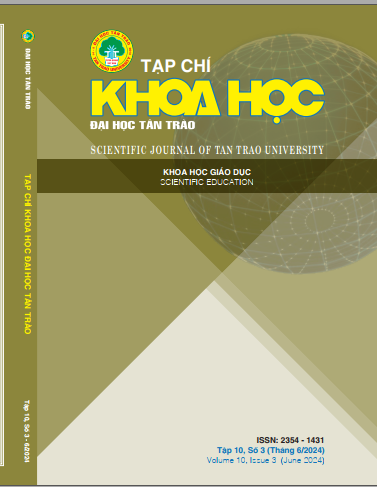MỘT SỐ VẤN ĐỀ LIÊN QUAN ĐẾN PHÁT TRIỂN VĂN HÓA NHÀ TRƯỜNG TẠI TRƯỜNG ĐẠI HỌC KHOA HỌC - ĐẠI HỌC THÁI NGUYÊN
DOI:
https://doi.org/10.51453/2354-1431/2024/1194Từ khóa:
TNU - University of Science School culture School culture develoTóm tắt
Văn hóa nhà trường tác động đển mọi mặt hoạt đông của nhà trường nói chung và trường đại học nói riêng. Trong bối cảnh hiện nay, việc phát triển văn hóa nhà trường có vai trò hết sức quan trọng bởi văn hóa nhà trường tích cực, lành mạnh sẽ giúp cho việc thực hiện các mục tiêu giáo dục của nhà trường hiệu quả, bền vững. Do vậy, phát triển văn hóa nhà trường đóng vai trò quan trọng và cần được thực hiện liên tục, phù hợp với chiến lược phát triển và tầm nhìn của nhà trường. Bài viết trình bày một số vấn đề liên quan đến phát triển văn hóa nhà trường trong Trường Đại học Khoa học, gồm: sự cần thiết phải phát triển văn hóa nhà trường, mức độ thực hiện lập kế hoạch và tổ chức triển khai xây dựng và các yếu tố ảnh hưởng đến phát triển văn hóa nhà trường bằng phương pháp thống kê, so sánh, đối chiếu; phân tích, tổng hợp, thu thập thông tin, số liệu từ việc khảo sát. Bài viết với mong muốn đưa ra một số giải pháp phát triển văn hóa nhà trường trong Trường Đại học Khoa học nhằm góp phần đào tạo, bồi dưỡng đội ngũ cán bộ viên chức, người lao động có chất lượng phục vụ yêu cầu cải cách hành chính và đổi mới quản lý giáo dục đào tạo ở Việt Nam hiện nay.
Tải xuống
Tài liệu tham khảo
Bahar Gun, Esin Caglayan (2013). “Implications from the Diagnosis of a School Culture at a Higher Education Institution”, Turkish Online Journal of Qualitative Inquiry, January 2013.
Barbara Fralinger, Valerie Olson (2007). “Organizational Culture at the University Level: A Study Using the OCAI Instrument”, Journal of College Teaching & Learning, 4 (11). Pham Thi Ly (trans.) “Organizational Culture at the School Level: Some Studies Based on the Organizational Culture Assessment Instrument (OCAI).
Bass, R.S. (2002). “The Culture Builder”, Educational Leadership.
Deal, T. E., Peterson, K. D. (2009). The Shaping School Culture Fieldbook, 2nd Edition, John Wiley & Sons.
Dhillon, J.K. (2001). “Challenges and Strategies for Improving the Quality of Information in a University Setting: A Case Study”, Total Quality Management.
Do Dinh Thai (2020). “Some Issues Related to the Development of School Culture at Saigon University.” Journal of Educational Science Vietnam, No. 26, pp. 26-41.
Le Thi Oanh (2018). “Building the Educational Environment in Specialized High Schools from an Organizational Culture Perspective.” PhD Dissertation in Educational Theory and History, Hanoi University of Education.
Nguyen Thi Hoang Yen, Nguyen Thi Thanh, Phan Trong Dong (2022). “Building School Culture: The Best Environment for Educating Cultural Values for Secondary School Students”, Journal of Educational Science, No. 01, pp. 1-7.
Nguyen Thi Minh Nguyet (2014). “Special Topic on Building and Developing Schools.” Hanoi University of Education.
Peterson, K. D. (2002). “Positive or Negative”, Journal of Staff Development.
Pham Minh Hac (2013). “Educating Values to Build School Culture.” Saigon University Journal, No. 17, pp. 5-12.
Pham Thi Minh Hanh (2012). “School Culture: Concepts, Roles, Nature, and Some Fundamental Factors.” Journal of Educational Science, No. 87, pp. 34-35.
Thai Duy Tuyen (2009). “Exploring Ho Chi Minh's Thoughts on School Culture.” In Proceedings of the Scientific Conference on School Culture: Theory and Practice, Psychological and Educational Sciences Conference, Hanoi.
Tải xuống
Đã Xuất bản
Cách trích dẫn
Số
Chuyên mục
Giấy phép

Tác phẩm này được cấp phép theo Giấy phép Quốc tế Creative Commons Attribution-ShareAlike 4.0 .
Bài báo được xuất bản ở Tạp chí Khoa học Đại học Tân Trào được cấp phép theo giấy phép Ghi công - Chia sẻ tương tự 4.0 Quốc tế (CC BY-SA). Theo đó, các tác giả khác có thể sao chép, chuyển đổi hay phân phối lại các bài báo này với mục đích hợp pháp trên mọi phương tiện, với điều kiện họ trích dẫn tác giả, Tạp chí Khoa học Đại học Tân Trào và đường link đến bản quyền; nêu rõ các thay đổi đã thực hiện và các nghiên cứu đăng lại được tiến hành theo cùng một bản quyền.
Bản quyền bài báo thuộc về các tác giả, không hạn chế số lượng. Tạp chí Khoa học Tân Trào được cấp giấy phép không độc quyền để xuất bản bài báo với tư cách nhà xuất bản nguồn, kèm theo quyền thương mại để in các bài báo cung cấp cho các thư viện và cá nhân.
Mặc dù các điều khoản của giấy phép CC BY-SA không dành cho các tác giả (với tư cách là người giữ bản quyền của bài báo, họ không bị hạn chế về quyền hạn), khi gửi bài tới Tạp chí Khoa học Đại học Tân Trào, tác giả cần đáp ứng quyền của độc giả, và cần cấp quyền cho bên thứ 3 sử dụng bài báo của họ trong phạm vi của giấy phép.






